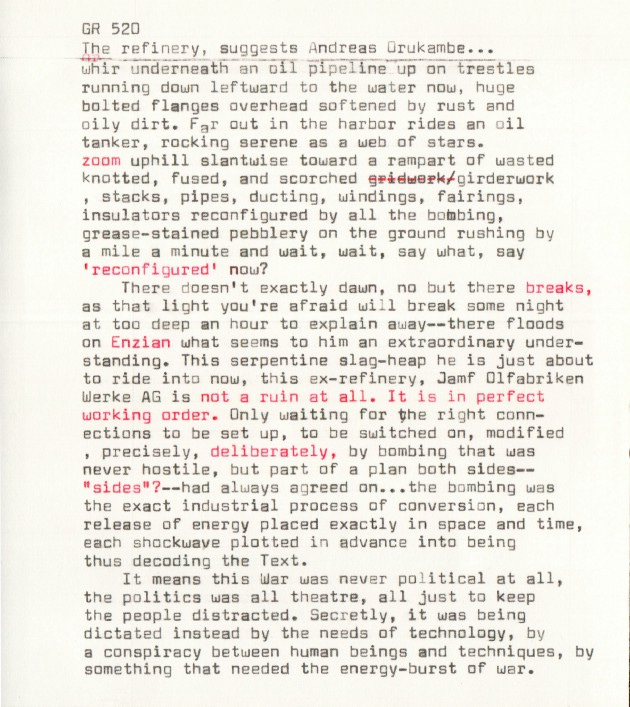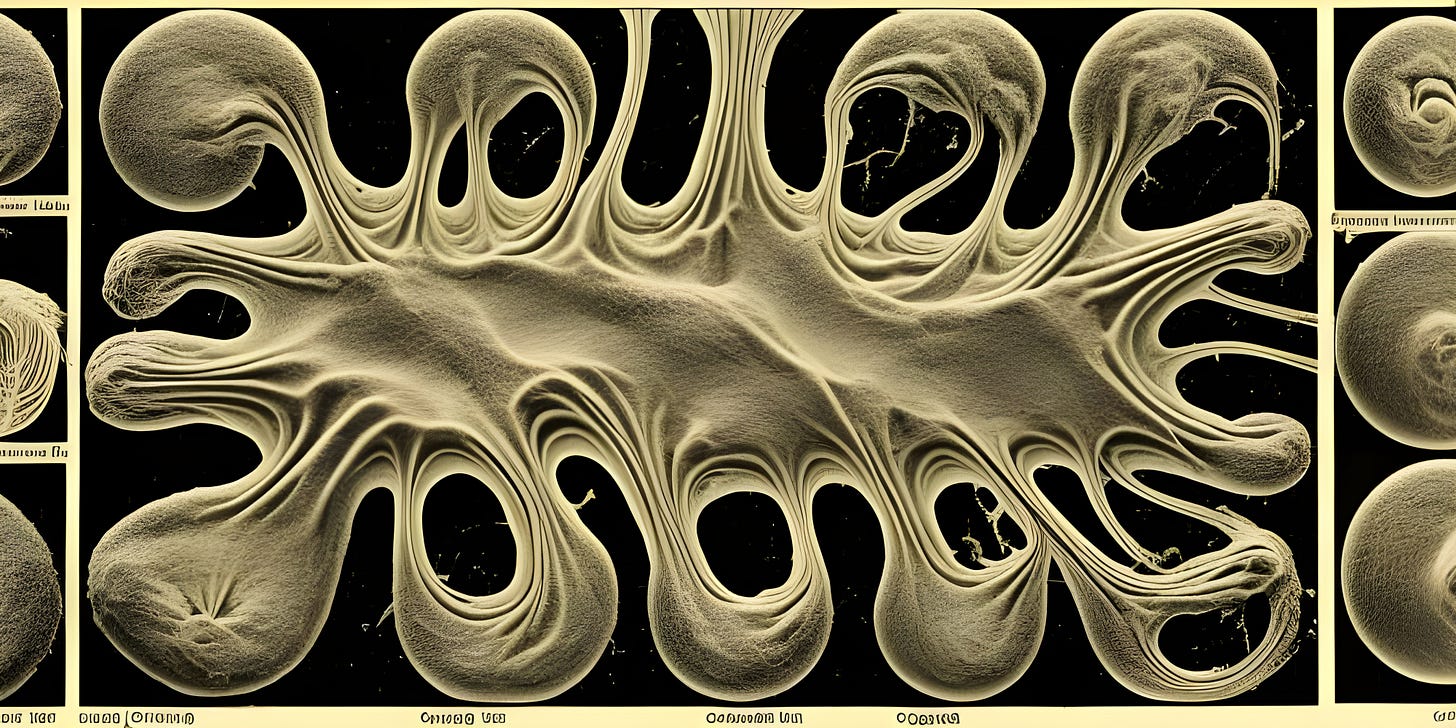I wrote this in 2020 and posted it in early ‘21. It was the first piece in the overall project I’m still working on. It sorely needed revision. I’d thought I could do the whole petrohistory of America in 2,000 words, but in fact I was just beginning a bigger project. Now that this revision is done, I consider this to be the starting place for anyone coming to my project for the first time. I'm very grateful to those of you who came to my work at various points and had to figure out what the fuck I was talking about with no or poor context. The following piece might be about as clear as mud, as they say, but at least it’s intended to be The Beginning, to be followed by the Apocalypse Confidential essay in the book that will someday maybe exist.
Speaking of the book that may someday exist, my goal with this substack is to generate a large enough list that a publisher will feel comfortable taking a risk on the book even though my work is…not for everyone. Since this is meant to be the beginning, this is the piece to share. If you like what I’m doing here, please help me grow my audience.
One of the mistakes in the original: I said that Fritz Haber went to Japan after he was finally unseated from the Kaiser Wilhelm Institute. I’m not sure where I got that idea. He literally and figuratively died on his way to Palestine, only finally embracing his Judaism via Zionism. Read Nitrogen for context on that.
Co-hosting on the audio version are my Hermes 3000, which typed the pages included as images, and my Outside Typewriter, the Rambo of Ultraportables, the very thocky Antares Parva.
"The Sixth Hyperstitional Entity of Oil:1 Hydrocarbon Corpse Juice: a post-apocalyptic entity composed of organic corpses flattened, piled up and liquidated in sedimentary basins (mega-graveyards); geologists suggest that if a high sedimentation rate preserves organic material, a catastrophic sedimentation rate (The Flood) would uproot, kill, and bury organic material so rapidly as to cut the porphyrin2 off from oxidizing agents which would destroy them in the ocean water. Oil as the post-mortem production of organisms is bound to death. Since its ethos — both origin and end — is purely teleological, whatever it inspires is founded on death and the logic of death and eventual conclusion. Oil as hydrocarbon corpse juice is itself a mortal entity which has been the source of ideology for petro-masonic orders and their policies — from OPEC to the agencies of the War on Terror to pomo-leftists.… It is extracted through teleological instrumentalization of the socio-political body of the Earth.” —Cyclonopedia: Complicity with Anonymous Materials by Reza Negarestani
All energy on the planet is solar energy. This solar energy exists here on earth as movement, heat, and biochemical energy. It matters what machines we use to convert that solar and photosynthetic energy into survival, and, ultimately, wealth. Before the Industrial Revolution, most of those machines were animals, including most importantly, human animals, who could convert biochemical energy into muscle power and so labor power. Under this preindustrial regime, the most efficient way to gain power was to accumulate and control human bodies: slaves. Ultimately, slavery was the engine of colonialism — the energy that drove the domineering Europeans to invade, occupy, dominate and control so very many communities around the world. Slavery came to demand a total logic of white supremacy that infected everything. And then, our story begins:
In 1880, Pattillo Higgins, a White Supremacist in Beaumont, Texas, with a fourth grade education, threw a bomb into a Black church and started shooting into the windows. I don’t know whether he killed any of the churchgoers, as far as I can tell, it wasn’t recorded. However, Patillo got in a shootout with the cops who responded to the scene, and he killed one of them. Pattillo was acquitted of the murder, since after all, he was simply performing his duty as a young racist to terrorize Black people in their own church, and the cop was a race traitor for defending them, and this was Eastern Texas in 1880 (“self-defense”). He was seventeen.
Living free in Beaumont without fear of reprisal, Higgins became active in his Church, and somehow ended up teaching a girl’s Sunday School class. As you might expect from someone of his caliber, he “fell in love” with one of them, which to me must mean that he raped her. He did name his oil company after her. Anyway, one Sunday he took the girls up to a hill outside of town, called Spindletop, and thought he smelled oil. He bought the land and spent the next nine years trying to drill for oil there, and failing to do anything, wasting intolerable amounts of capital, and yet always getting bailed out (just like that jury did back in Beaumont). Then in January, 1901, oil erupted out of the hole, destroying the machinery and shooting 100 feet above the derrick. It flowed for 9 days at a rate of 100,000 barrels a day, as if it was eager to be free of its subterranean lair: not quite as a caged animal would escape into freedom, more like an ejaculation that doesn’t end. That 900,000 barrels of oil was the vanguard of oil’s entropic conquest of America, as Texans and other White southerners made themselves rich and Capital was mobilized to tap the flow of distilled photosynthesis spurting out of the ground, turning money into oil’s key instrument to get itself into combustion chambers to release its pent-up joules.
Suddenly we could tap hundreds of thousands of years of photosynthetic energy at once, millions of metric tons of oil just bursting out of the ground, flinging itself at us like a horny teenager. After Spindletop, new oil fountains kept leaping up around Texas, Louisiana, Arkansas, Oklahoma, each one creating a new capital stream, each one making rich first a few White men, then groups of them as the streams began to run together into rivers: Texaco, Chevron, Hunt Oil. This was the birth of a new global power with a center of gravity in the former Slave states, where, at the time, the Civil War was referred to as “The Lost Cause.”
(It is worth mentioning that coal, which was the tellurian entity that spawned the first phase of the industrial revolution, and which continues to be a major necrotic agent today, has its own personal history, different from but related to that of oil.)
So, modern American petrohistory is about 120 years old. Not a long time, just longer than the life of a real person, and indeed, many people still alive have lived through the great majority of it. On a timeline, the fossil fuel age looks like the flame on a long cigarette. And it’s creating an epochal extinction event that will be quite unpleasant to live through.
But apparently 120 years was long enough to seem like it’s always been here, and always will be. Apparently, it was long enough for capitalism to complete its domination around the globe, long enough for it to grow into maturity as colonialism’s replacement. Long enough to spread the false dogma of progress, of a natural human right to air conditioning, internet, and power tools (none of which I’m prepared to live without). Long enough to make it seem like anyone without a national regime of mass consumption has been left behind, and need to be doing everything they can to “develop.” Long enough to create a third world and intentionally, cruelly impoverish it, long enough to destroy the idea of a second world, the only alternative that gained enough power to pose a dialectic challenge to capitalism: Communism. Long enough to irrevocably change the climate of the world and trigger a mass extinction event that will be the defining feature of the 21st century. Long enough, in other words, to remake the world.
I believe that oil is a sentient entity, with its own intelligence and motivations. That it has manipulated humanity into its own self-demise. To make myself seem moderate and mainstream, I’ll start by citing Amitav Ghosh, who, building on the fact that today scientists accept that trees in a forest are able to communicate with one another, develops a very common sense vision of arboreal consciousness:
“In that humans lack the ability to communicate as trees do, could it not be said that for a tree it is the human who is mute? If trees possessed modes of reasoning, their thoughts would be calibrated to a completely different timescale, perhaps one in which they anticipate that most humans will perish because of a planetary catastrophe. The world after such an event would be one in which trees would flourish as never before, on soil enriched by billions of decomposing human bodies. It may appear self-evident to humans that they are the gardeners who decide what happens to trees. Yet, on a different timescale, it might appear equally evident that trees are gardening humans.”
Well said, as always; but why are you talking about trees in such necrophiliac terms? Trees may well be our best allies and friends, one of our best defenses against the real enemies: Fossil Fuels. Oil, Gas, and Coal are directly changing the climate. They are the direct and proximate cause of warming the planet. Why should we not believe they are doing so on purpose? If humans are in control, why do we have so little control here?
If oil were intelligent, it would be a deeply inhuman intelligence — alien in a terrestrial sense — and so, as Stanislaw Lem illustrates, utterly unrecognizable and incomprehensible to us. Oil doesn’t speak human languages, and we may never know just what it wants. But we can guess, by interpreting its behavior. The humans who are indentured to the cause of Oil — for instance, “oil companies” — do not speak or act for oil, even though they work in oil’s interest. Nonetheless, by looking at the actions of those people and corporate persons, we may discern the outlines of oil’s plan: “moving the Earth’s body toward the Tellurian Omega — the utter degradation of the Earth as a Whole” (Cyclonopedia, 17).
Oil is the most influential nonhuman consciousness in the history of humanity. Oil was on every side of every war of the 20th century. And so, it can be said that in the 20th century, history stopped being human history.
Oil is inhabited by war machines, a tendency toward violence and domination; a unification of power by the fascist forces of combustion. Any one agent of this power is completely disposable and replaceable, any individual easily sacrificed. It’s in the action of sacrifice where the profit is made. The fissuring of carbon structures, the release of Joules into Watts.
History can now only be told of the ascent from the ground of this primordial power, the ongoing apotheosis/combustion of fossil fuels into atmospheric carbon. And once burned, of course, that carbon could heat the earth. Perhaps its goal is to recreate the conditions of the biosphere from 358 million years ago, when most of that stuff was alive.*** Reptiles ruled the world when the solar energy was captured by the plants that went on to become oil; it is their world that we burn. What should we call this? I suggest we stick with the obvious: Petrolocism (petrolocized, petrolocization) is the process of being reconstituted by oil, and thereby accelerated greatly. Look, for example, at the agriculture sector: Food production was petrolocized after Fritz Haber invented nitrogen fertilizer in 1909. And so on, for every area of the economy.
This is where Gravity’s Rainbow picks up the story. Gravity is what the rocket must push against: a force and a counterforce, a We system and a They system. It is also the force that created oil by repressing and condensing organic matter over time.
Lyle Bland, the billionaire Masonic spiritualist, who “has had his meathooks well into the American day-to-day since 1919,” digs very deep into the occult and spiritual aspects of his business club, and begins his own spiritual journey:
Bland, still an apprentice, hadn’t yet shaken off his fondness for hallucinating. He knows where he is when he’s there, but when he comes back, he imagines that he has been journeying underneath history: that history is Earth’s mind, and that there are layers, set very deep, layers of history analogous to layers of coal and oil in Earth’s body. The foreigners sit in his parlor, hissing over him, leaving offensive films of sebum on everything they touch, trying to see him through this phase, clearly impatient with what they feel are the tastes of a loafer and vulgarian. He comes back raving about the presences he has found out there, members of an astral IG, whose mission—as indeed Rathenau implied through the medium of Peter Sachsa—is past secular good and evil: distinctions like that are meaningless out there. . . .
“Yess, yess,” all staring at him, “but then why keep saying ’mind and body’? Why make that distinction?”
Because it’s hard to get over the wonder of finding that Earth is a living critter, after all these years of thinking about a big dumb rock to find a body and psyche, he feels like a child again, he knows that in theory he must not attach himself, but still he is in love with his sense of wonder, with having found it again, even this late, even knowing he must soon let it go. . . . To find that Gravity, taken so for granted, is really something eerie, Messianic, extrasensory in Earth’s mindbody . . . having hugged to its holy center the wastes of dead species, gathered, packed, transmuted, realigned, and rewoven molecules to be taken up again by the coal-tar Kabbalists of the other side, the ones Bland on his voyages has noted, taken boiled off, teased apart, explicated to every last permutation of useful magic, centuries past exhaustion still finding new molecular pieces, combining and recombining them into new synthetics—
Worth noting that Bland is maybe the only character who’s entirely in control of himself because he’s in control of everything around him, unlike Slothrop, who has no idea what’s really going on, and knows it.
Gravity’s Rainbow is a novel in which the War is the main character. War is explained to be a self-reproducing iterative program, a driving essence that we call Capitalism, but was never about competitive markets. It was instead about funding and allocations of capital. This “real War” was a machine that was in “perfect working order” as soon as the war ended, when it could pivot from opposition to acquisition of the Nazi war machines, and reoriented against the Soviet Union.
The Cold War was never really about the Russians, it was about the takeover of America. It was about making a world in which there is no alternative to whatever degraded state of monopoly-captured Capitalism we now find ourselves in. Communism was the last dialectical challenge to Petrocapitalism. They did destroy the very real Communist and Socialist movement in America, and destroyed labor organizations. But they were collateral damage to the “real War.” Very convenient to have them out of the way.
Oil rode the Cold War to utter domination in the form of American Capitalism, in part by creating better consumers. Through the actions taken by Cold Warriors, oil put itself in a position to wage an extermination campaign — an ecocide — against humanity and many thousands of other species in an the fastest and most intense mass extinction event in the history of the world, which is now only beginning to gain its momentum. It did so by creating a permanent state of war, a fight against an Other to drive policy and accumulate wealth, sometimes also called “funding,” rather than a positive ideology like Socialism, which could have distributed funding to the people’s needs.
It has built a world where constant consumption of petroenergy is an inevitability, all day, every day. I don’t want to live without it, certainly not unilaterally. If we all could commit to an energy use strike, I’d consider the practicality of joining myself. But since we can’t even approach collective action, I’m enjoying my comfort.
In the end, this is not about humans. We’re not going to survive (or maybe some version of “we” will), but the earth will. So we’re not really the protagonist of our own history now. Now we are an instrument of Oil, and our tenure is but one battle in a much longer struggle between void and combustion, gravity and matter, an entropic dialectic played out presumably around every star in the galaxy. Energy gets radiated, absorbed, subsumed, and then released again. Life is just a sometimes-artifact of this flow.
If you want to keep reading the Hydrocarbon Corpse Juice project:
The Autonomous Chemical Weapon at Apocalypse Confidential Part I
The Autonomous Chemical Weapon Part 2
Environmentalism (ideology)
And I’m writing Methane and Coal.
Or you can wait until I synthesize all this into a book, and read it in its final version. I’m thinking it will be organized chronologically, rather than a separate chapter for each type of material.
Lubricant or Tellurian Lube
The Hunter of the Dead Seas: Ghoul-e Naft
The Nether Blob
The Black Corpse of the Sun
Hydrocarbon Corpse Juice
Devil’s Excrement
Gaia’s aromatic juice
The Pipeline-Crawler (Go-juice)
Infernotron
compounds common to both blood and oil






